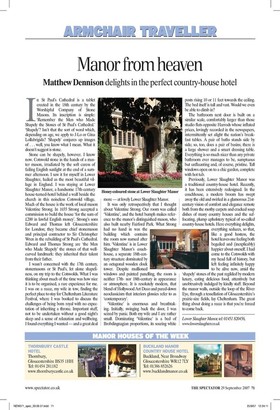anor from heaven
Matthew Dennison delights in the perfect country-house hotel 1 n St Paul's Cathedral is a tablet erected in the 18th century by the Worshipful Company of Stone Masons. Its inscription is simple. 'Remember the Men who Made Shapely the Stones of St Paul's Cathedral.'
'Shapely'? Isn't that the sort of word which, depending on age, we apply to J-Lo or Gina Lollabrigida? 'Shapely' conjures up images of. . . well, you know what I mean. What it doesn't suggest is stone.
Stone can be shapely, however. I know now. Cotswold stone in the hands of a master mason, irradiated by the soft caress of failing English sunlight at the end of a summer afternoon. I saw it for myself in Lower Slaughter, hailed as the most beautiful village in England I was staying at Lower Slaughter Manor, a handsome 17th-century house-turned-hotel behind a wall beside the church in this noiseless Cotswold village. Much of the house is the work of local mason Valentine Strong. In 1655 Strong accepted a commission to build the house `for the sum of £200 in lawful English money'. Strong's sons Edward and Thomas left Gloucestershire for London; they became chief stonemason and principal contractor to Sir Christopher Wren in the rebuilding of St Paul's Cathedral. Edward and Thomas Strong are `the Men who Made Shapely' the stones of that wellcurved landmark: they inherited their talent from their father.
I wasn't concerned with the 17th century, stonemasons or St Paul's, let alone shapeliness, on my trip to the Cotswolds. What I was thinking about much of the time was how nice it is to be organised, a rare experience for me. I was on a recce, my wife in tow, finding the perfect place to stay for Cheltenham Literature Festival, where I was booked to discuss the challenges of being born royal with no expectation of inheriting a throne. Important stuff, not to be undertaken without a good night's sleep and a sense of relaxation and wellbeing. I found everything I wanted — and a great deal more — at lovely Lower Slaughter Manor.
It was only retrospectively that I thought about Valentine Strong. Our room was called 'Valentine', and the hotel bumph makes reference to the manor's distinguished mason, who also built nearby Fairford Park. What Strong had no hand in was the building which contains the room now named after him 'Valentine' is in Lower Slaughter Manor's coachhouse, a separate 18th-century structure dominated by an octagonal wooden clock tower. Despite mullioned windows and painted panelling, the room is neither 17thnor 18th-century in appearance or atmosphere. It is resolutely modern, that blend of Hollywood Art Deco and pared-down neoclassicism that interiors glossies refer to as 'contemporary'.
'Valentine' is enormous and breathtaking. Initially, swinging back the door, I was seized by panic. Both my wife and I are rather small. Dominating 'Valentine' is a bed of Brobdingnagian proportions, its soaring white posts rising 10 or 11 feet towards the ceiling. The bed itself is tall and vast Would we even be able to climb in?
The bathroom next door is built on a similar scale, comfortably larger than those studio flats opposite Harrods whose inflated prices, lovingly recorded in the newspapers, intermittently set alight the nation's breakfast tables. A pair of baths stands side by side; so, too, does a pair of basins; there is a large shower and a smart dressing table. Everything is so much nicer than any private bathroom ever manages to be, sumptuous but unflaunting and, of course, pristine. Tall windows open on to a chic garden, complete with hot tub.
Previously, Lower Slaughter Manor was a traditional country-house hotel. Recently, it has been extensively redesigned. In the coachhouse, a modern broom has swept away the old and swirled in a glamorous 21stcentury vision of comfort and elegance remote both from the mothy carpets and cracked soap dishes of many country houses and the suffocating, plump upholstery typical of so-called country-house hotels. Here everything delights, everything seduces, so that, like a good hostess, the hotel leaves one feeling both beguiled and (inexplicably) happier about oneself. I had come to the Cotswolds with my head full of history, but left feeling infinitely happy to be alive now, amid the 'shapely' stones of the past regilded by modern luxury, eating delicious food, attentively but unobtrusively indulged by kindly staff. Beyond the manor walls, outside the loop of the River Eye, through a tessellation of Gloucestershire's prairie-size fields, lay Cheltenham. The great thing about doing a recce is that you're forced to come back.
Lower Slaughter Manor; tel: 01451 820456, www.lowerslaughterco.uk























































 Previous page
Previous page